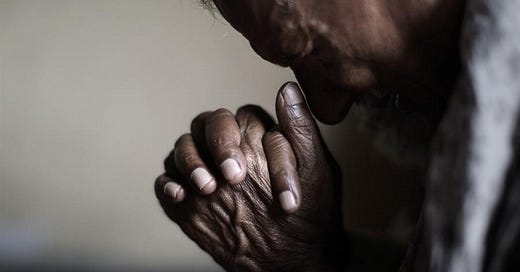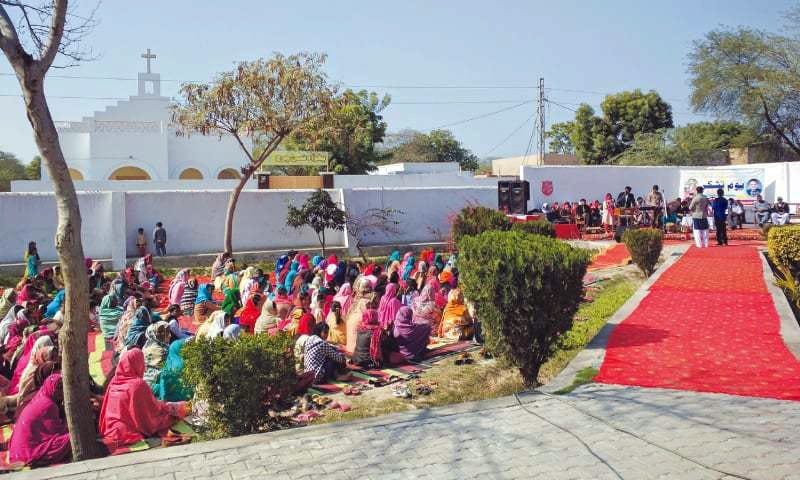It wasn’t that I forgot the date. It has been a hard date to forget ever since it happened.
Shantinagar translates to place of peace. It is a village almost two hundred miles southwest of Lahore. It is where Mum was raised, and where my maternal grandparents lived for most of their lives. When we returned to Pakistan in 1970, we spent our first Christmas there. We would return there for visits in the summer and Christmas. It felt like a peaceful place away from the hustle and bustle and madness of Lahore. Also, while it was an interfaith community, it was one of the villages established by British Christians in the early twentieth century, and has had a Christian majority for all of its existence.
Naniji (Nani = maternal grandmother) used to have theological conversations with Muslim men and there were disagreements, of course, but none of those conversations ever resulted in threats or violence due to blasphemy. Although, according to Mum, Naniji did share a story about how a mob was prepared to attack their village, once upon a time, and as they were crossing the bridge, they stopped midway, and something, a force, something powerful persuaded them to turn around and go back.
I am not certain of the veracity of this story, but in the aftermath of February 6th, 1997, I wished it were true, because such a turnaround would not happen again.
***
At some point between February 5th and 6th, 1997, I woke up on a winter morning in Portland, and as I used to do at that time, read world news online, as well as news from Pakistan first thing in the morning. There was a brief report on how a mob had attacked Shantinagar. I was thrown into a tailspin. We still had (and have) family that remained in the village. Mum’s eldest surviving brother (and my favorite uncle) and family lived there. I called home and alerted my parents. Benji tried to downplay it, perhaps to calm me down, and Mum assured me that she would find out what she could and get back to me.
If there was work, or classes that day, I couldn’t go. This was before I had a cell phone. I stayed at home all day, hoping that no one had died. I couldn’t think of doing anything else.
Mum called me later in the afternoon. One of her cousins telephoned to let her know that there was a lot of damage done to the village, but our relatives were okay. We would find out more later.
***
The story begins in January, 1997, actually, when policemen raided the house of Baba Raji who ran a gambling and moonshine den. In the process of the raid, one of the policemen threw his Bible on the ground. Baba Raji accused the policemen of desecrating the holy book. It was possible, according to a witness, that they did not realize that the book was a Bible.
In a country where blasphemy laws only apply when it comes to Islam, this was somewhat unusual, and some Christians in the community were not willing to let it go. The policeman was suspended. And while Christians may have thought the law was on their side, this was far from over.
***
On the evening of February 5th, 1997, during evening prayers at a mosque in Khanewal, the closest town to the village, news spread that pages of the Quran had been ripped out and desecrated. It was suggested that someone from one of the eight majority Christian villages may have done it. I can only imagine what was shouted through loudspeakers at mosques. By daylight, on February 6th, a mob of thousands descended upon the villages. Christians needed to be taught a lesson, and the lesson was the harshest they had received since 1947.
The mob set Shantinagar and Tibba on fire. Tibba village, if I remember correctly, was a tiny village set on the dunes which were adjacent to the cemetery. Before the dunes became a village, we used to play on them when we’d visit for Christmas. The mob burned 13 churches to the ground, one of them most likely where my grandparents’ and cousin’s funerals were officiated. 775 houses were razed, one of them belonging to one of Mum’s cousins. 3 schools destroyed, and in Khanewal, 10 shops decimated. 1
Part of the mob came to what had been Nanaji’s house from his youth to his death, and was then BaRe Maamoo’s (Mum’s eldest brother). They tried to get in the house, but one of my cousins fired a shot. He was not aiming at anyone, he wanted to scare them off, but someone was hit. My cousin’s life would be threatened for a long while after that day, even after he was acquitted of charges. He had to leave the village for a while.
The police could not contain the thousands of revenge-hungry people, and there were doubts as to whether some had even tried. By nightfall, a once peaceful village was all but destroyed.
But the residents of Shantinagar refused to let this destroy them. The community came together and were joined by others to rebuild. And every year they remember, and they want their children and grandchildren to remember. And I want to remember.
***
I was angry for quite a while after the attack on Shantinagar. I still had my Pakistani passport and I wanted to rip it into shreds. I wanted nothing to do with the country of my birth. And I was not even there. So I can imagine how some Christians felt towards their Muslim neighbors. Reconciliation was gradual. And while I was angry, my anger was not directed at all Muslims, or all Pakistanis. It was directed at those who burned down Mum’s village, and it was also directed at the State. And for that, I was considered by some as a traitor to a country I no longer lived in. It took me a while to remember what I loved about Pakistan, and to keep that in my heart.
I noticed the change in Maamoo. One day, I was talking to him on the phone, and I replied “Inshallah!” to something he said. There was a pause, what felt like a rather pregnant pause, and then:
“Only Muslims say inshallah.” The Arabic phrase translates to “God/Allah willing.”
“I don’t think that’s true. And I’ve said this often.”
Thankfully, we did not argue about it any further. I wondered if I had imagined the coolness of his tone. It definitely was an admonition. After we ended our conversation and Mum and he said their goodbyes, I mentioned that exchange to her.
Mum harrumphed, “I don’t know why he told you that. He’s wrong.”
“I know! I’ve heard more than a few Lebanese Christians say that.”
I wondered if Maamoo’s feelings towards Muslims had changed irrevocably. Then again, I don’t think I ever knew what they were. When Nanaji died, Mum’s youngest brother inherited the land behind the house, while the eldest brother inherited the house itself. My youngest maamoo wanted to sell the land, and he was considering selling it to a Muslim. I think most of us preferred that it stay within the family, but I also know that some of us had doubts about Maamoo having a Muslim as a neighbor. Especially in a time when the Islamicization of Pakistan was in full force after the 1977 coup.
***
The punishment for blasphemy against Islam, and especially the Prophet Muhammad (Peace Be Upon Him) is death. And a mention by one of blasphemy spreads like wildfire, and before we know it, someone has been lynched, or imprisoned and sentenced to death in Pakistan. If bigotry is challenged, it can result in a baseless blasphemy charge. This blasphemy law is so misused and that the Supreme Court Justice wisely cautions the police to be more circumspect in charging someone with blasphemy should be one of those moments of introspection, and of praise. But no, this is not to be. And I fear for Justice Qazi Faez Isa’s life, and pray that no harm comes to him, because Pakistan needs more like him in their courts.
The world needs more people with compassion and a sense of justice for the madness that surrounds us to end. Throwing stones, both actual and metaphorical, continue to have devastating consequences, and yes, we can rebuild villages, and we can rebuild communities, but rebuilding ourselves takes so much longer sometimes, and some refuse to even do so. The Doobie Brothers’ song asks, “Without love, where would you be now . . .”
The answer is all around us.
Much of the information about Shantinagar was from this report https://www.dawn.com/news/1313096. Additional information was from other reports and personal stories.





